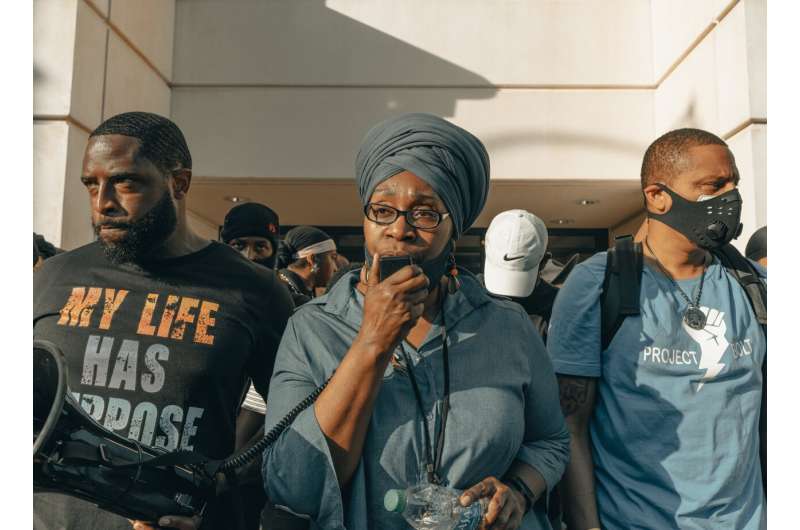This article has been reviewed according to Science X's editorial process and policies. Editors have highlighted the following attributes while ensuring the content's credibility:
fact-checked
peer-reviewed publication
trusted source
proofread
Study: Support for Black nationalism now more widespread as profile of Black nationalist has changed across time

According to research by sociologists at Rice University, Black nationalism now finds broader support among different segments of the Black community, though the characteristics of Black nationalists have changed over time.
Black nationalism is a belief system that promotes the best ways to achieve racial equality. Black nationalists believe that working with whites, integrating racially and participating in mainstream politics won't achieve true racial equality. Instead, they advocate for the creation and support of separate cultural, economic, political and social institutions for Black communities, focusing on autonomy and self-reliance as essential strategies for survival and empowerment.
Lead researcher Tony Brown, distinguished professor of sociology at Rice, and co-author Quintin Gorman Jr., a Rice Ph.D. student, used data from Black adults participating in the 2012 Outlook on Life Surveys to determine the profile of a Black nationalist today.
The study, "Wakanda Forever! Consistency in Correlates of Black Nationalist Tendencies," appears in Social Science Quarterly.
Their findings show that while studies from the 1980s, 1990s and early 2000s suggest factors like age, gender, income, education and, to a lesser degree, religiosity are primary predictors of Black nationalist tendencies, none of these characteristics predicted Black nationalism today.
"The profile of who is a Black nationalist or a supporter is less clear than in past years," Brown said. "It's more generally and widely accepted in various circles."
Brown said the only two consistent factors that were linked to Black nationalism were white antipathy—a strong dislike of or hostility toward whites—and common fate—a feeling of Black solidarity or unity.
"Past studies typically found that young Black people wanted to be separate from whites, Black men wanted their own sovereign nation and people with high levels of income and education did not support Black nationalism as they had success in the current system," Brown said. "Our findings show that age wasn't a predictor, men and women were the same and there were no income or education effects."
The study references the hugely popular "Black Panther" movie from 2018, which became one of the most profitable movies ever, grossing about $570 million stateside and over $1 billion internationally in under a month. The researchers suggest that the movie's portrayal of the sovereign nation of Wakanda represents ideals that are consistent with Black nationalism—separatism and solidarity.
"Although the storyline is fantasy, something about the sovereign nation of Wakanda resonated with Black moviegoers," the study states. "We think its resonance derives from the not-so-subtle connection to black nationalism."
Brown said while there hasn't been hard evidence proven to explain the change in predictors of Black nationalism across time, he theorizes that historical happenings since the 1980s have influenced Black people's thoughts on Black nationalism. Examples would include: the rise of the prison-industrial complex, widespread gentrification and displacement processes, the underfunding of public schools with a Black majority, the Great Recession, growing health disparities, on-going police brutality and the Flint water crisis.
"All these things show how white supremacy endures, and it's at a moment when I think many Black people thought real racial progress had been made," Brown said. "They're now realizing that some things haven't changed as much as we thought they had changed."
The study's analyses also show that former President Barack Obama's election affected views of Black nationalism, creating high expectations that left many Black voters feeling disappointed.
"We think a part of what we're observing is that Obama's election also changed how people thought about the world," Brown said. "People are thinking, 'Why isn't the world a better place? Why is it that four years after he was elected, we're still mired in these kinds of things?'"
The researchers say they hope this study will encourage policymakers to imagine new ways of redressing racial inequality with an emphasis on what Black people think, believe, want and feel.
"Far too often those championing racial equality, or supposedly doing research that matters, ignore the views of Blacks themselves, assuming they can address white supremacy and its legacies without including the Black community in the problem-solving process," Brown said.
More information: Tony N. Brown et al, Wakanda forever! Consistency in correlates of black nationalist tendencies, Social Science Quarterly (2024). DOI: 10.1111/ssqu.13388
Journal information: Social Science Quarterly
Provided by Rice University



















